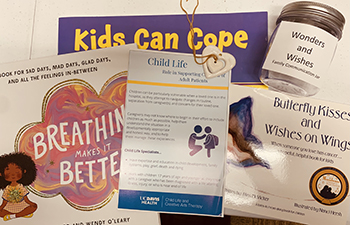How to help your child through loss, sickness due to COVID-19
Since the pandemic started, many parents have wondered how to help their child(ren) cope with their fears and anxiety. In many cases, they’re also helping children handle the illness or loss of a loved one due to COVID-19 as. Certified Child Life Specialist Marisa Martinez answers some frequently asked questions and provides tips and resources for parents and families.

How should parents start conversations with their children to help address any fears or anxiety that they may have about COVID-19?
When helping children deal with their fears and anxieties, it is important to have open-ended conversations with the child to learn what misconceptions they may have and to be able to address their questions. This coloring book created by a Certified Child Life Specialist helps to explain coronavirus in an age-appropriate way.
When children do ask questions, we do not always have the answers or know how to answer. This resource created by a child life student helps address children’s questions about COVID-19. If you are someone who likes podcasts, you can also listen to this podcast episode about using appropriate language while talking with children.
Both children and adults see a lot of information through the news, social media and conversations between family and friends about this virus. Even if you think the children are not listening or do not understand, it is important to know that children are great observers and listeners but are sometimes not the best interpreters. Especially for children who are 7-8 years old and younger. Developmentally they can have a stage of “magical thinking” that influences their brain in a way that makes it difficult to separate reality from fantasy and this can create more misconceptions.
What are ways to help children when they have a sick family member or friend in the hospital?
When a loved one is in the hospital and critically ill due to COVID-19 or any other circumstances, saying goodbye from afar can be difficult when visiting is not allowed. Children need opportunities and choices to say goodbye to help them cope with the death.
Some suggestions:
- Write a letter to their loved one
- Draw a picture that they can choose to keep or send to their loved on in the hospital
- Write a poem or song
- Make a list of things they have learned from their loved one
- Make a stone garden
- Plant a tree
- Bury a time capsule
Here are more ideas prepared by our Child Life and Creative Arts Therapy team at UC Davis Children’s Hospital.
How can we help our children cope with the loss of a loved one?
If someone in your life has died due to COVID-19, death and dying may be a concept you’re dealing with in your home. By encouraging your children to ask questions and by providing honest, age-appropriate information about death, you can help your child better understand and cope with this situation.
Some ways to help your child:
- Allow your child to see your emotions. They will realize that sadness is a natural reaction to sorrow and loss and may feel more comfortable sharing their feelings with you.
- Make sure your child understands that the body has “stopped working” because of (fill in with clearly stated medical reason).
- Further explain by stating that the body is “no longer able to do the things it used to such as breathe, move, eat, see, hear, touch, taste, smell, grow, talk, play, think and feel.”
- Use concrete language, such as “die,” “dying,” and “dead,” instead of euphemisms such as “went to sleep,” “went away” or “we lost her/him.” Children think very literally. These phrases are unclear and may cause worry related to going to sleep, going away or getting lost. These phrases can also make it challenging for the child to understand the finality of the situation. Emphasize how the nurses and doctors tried everything possible to help their family member.
- It is important to remember that kids learn and process the world around them through play. Try to take advantage of being at home and use this time to engage with your children in games, toys, puzzles, books, music and art. This time in play may also help you recognize some of your child’s misconceptions and fears.
It’s great to offer opportunities for children to engage in self-expressive activities, including art projects for loved ones, and you can utilize virtual tools to remain connected with friends and family. Try to make a routine for the day, when possible, so the child knows what to expect and has a sense of normalcy throughout the week. In this article you will find guidance on how to promote emotional resiliency and emotional regulation.
These are trying times and many people are connected from this shared experience of being away from family members and feeling afraid of the unknown. Remember to lean on your loved ones and have open communication about what is going on and what can help you.
What are some tips that you would recommend to help parents cope?
It is important to go easy on yourself as a parent/caregiver and remember that parental coping and self-care can positively impact your children’s coping. Everyone is balancing a lot and if you are able to do the smallest amount of self-care those are positive steps to promote effective coping.
Some self-care ideas:
- physical exercise
- mindfulness
- reading a book
- getting in touch with your spirituality
- deep breathing
- taking a hot shower
- finding time for gratitude
For more resources related to COVID-19 and children’s coping and understanding, please visit the Association of Child Life Professionals.

